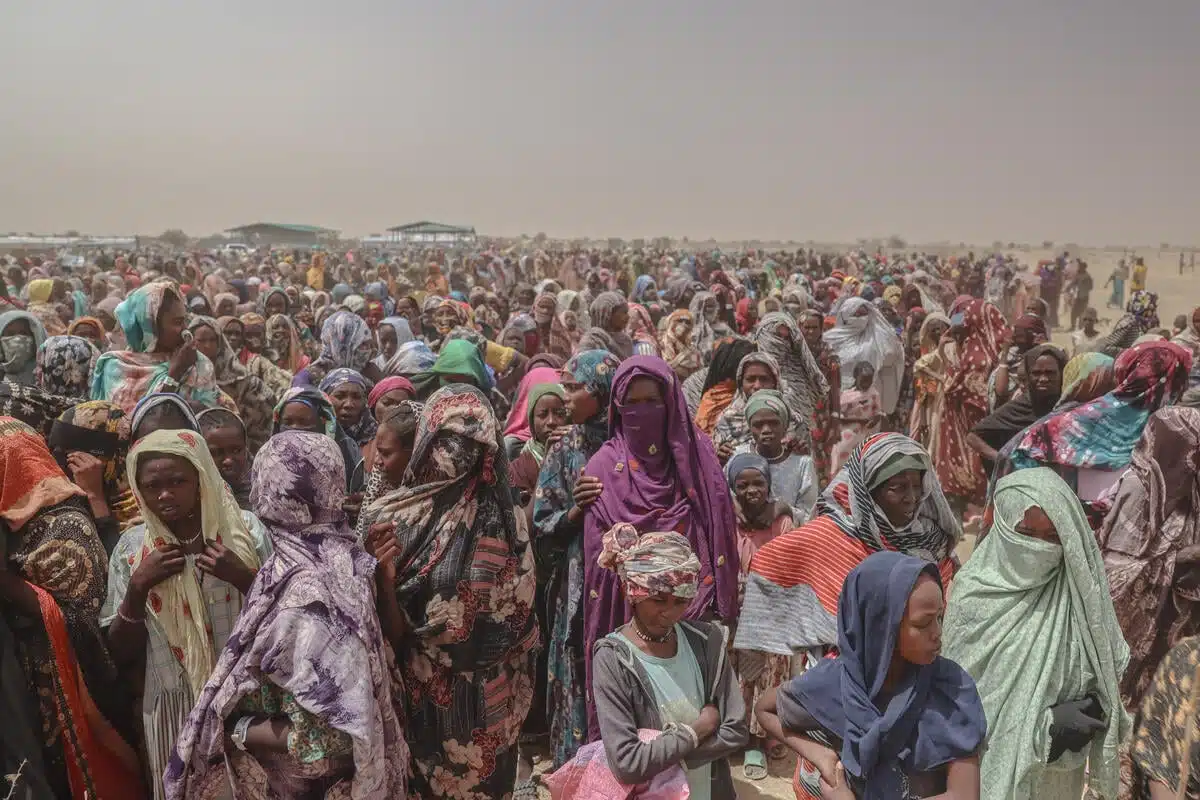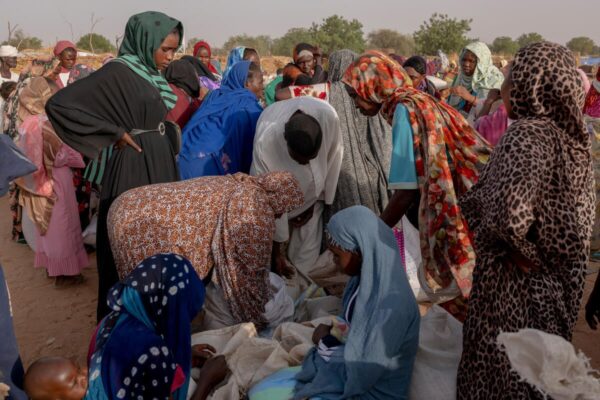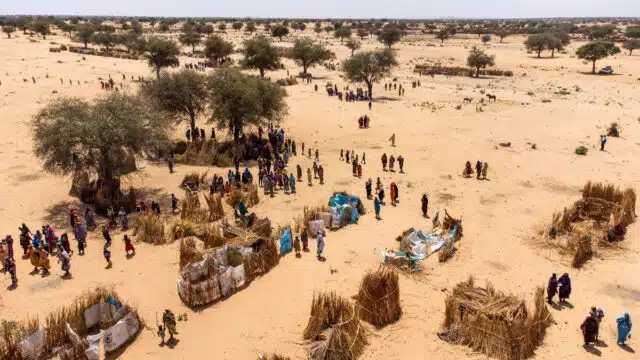
Thousands of newly arrived refugees from Sudan’s North Darfur region wait for food near the Tiné border crossing in Chad. © UNHCR/Caitlin Kelly
This is a summary of what was said by Magatte Guisse, UNHCR Representative in Chad – to whom quoted text may be attributed – at today’s press briefing at the Palais des Nations in Geneva.
GENEVA – UNHCR, the UN Refugee Agency, is gravely concerned by the rapidly increasing number of Sudanese refugees crossing into eastern Chad, with nearly 20,000 people – mostly exhausted and traumatized women and children – arriving in the past two weeks alone.
The sharpest rise has been recorded at the Tiné border crossing in Wadi Fira Province, where almost 6,000 people arrived in just two days. Since 21 April, over 14,000 individuals have been counted in Wadi Fira, including 12,000 in the last week, but also 5,300 people in Ennedi Est over the past fortnight, including 1,000 on Sunday alone. This sudden influx reflects the escalating violence in Sudan’s North Darfur region, particularly in and around El Fasher, which is triggering mass displacement at an alarming pace.
The latest movements follow brutal attacks by armed groups in North Darfur, where assaults on displacement camps – including Zamzam and Abu Shouk – and El Fasher town have caused widespread terror. Refugees arriving in Chad report that over 10,000 people are still en route, desperately trying to reach the border to escape the violence.
Many of the newly arrived refugees report experiencing grave violence and human rights violations that forced them to flee. They describe men being killed, women and girls subjected to sexual violence, and homes burned to the ground. Their journeys to safety were perilous, with refugees facing robbery and extortion at checkpoints and repeated threats along the way.
Most arrived in Chad with nothing – no food, money, or identification. Several wounded individuals, including children and elderly women, reportedly fell from vehicles during the chaotic escape. A rapid protection assessment by UNHCR and its partners indicates that 76 per cent of the newly arrived refugees were subjected to serious protection incidents, including extortion, theft and sexual violence.
At the same time, protection teams at the border have identified increasing numbers of people with specific needs – including 752 at-risk children, 22 of whom were injured in the conflict, as well as unaccompanied children, pregnant and breastfeeding women, and elderly survivors.
Despite extraordinary efforts by local communities and authorities, the capacity to absorb the new arrivals is severely overstretched. Chad already hosts 1.3 million refugees, including 794,000 arrivals from Sudan since the conflict started more than two years ago. While the country continues to show remarkable solidarity in hosting refugees, it cannot bear this burden alone. Humanitarian resources across the country remain extremely limited, while needs continue to grow for water, shelter, health, education and protection.
Since 23 April, eight convoys have relocated almost 1,850 newly arrived refugees to Iridimi, a site in Wadi Fira Province. UNHCR and partners are delivering life-saving assistance at border points and relocation sites, but current efforts remain far from sufficient given the scale of the crisis.
Attacks on civilians in Sudan must end, and safe passage needs to be allowed to those fleeing for their lives. UNHCR urges the international community to urgently step up support for the response. Of the $409 million required to respond to the refugee crisis in Chad in 2025, only 20 per cent has been funded to date. We urgently call for increased solidarity and immediate funding to ensure these vulnerable populations receive the protection and assistance they need, now.
For more information on this topic, please contact:
- In N’Djamena, Aristophane Ngargoune, ngargoun@unhcr.org, +235 66 98 37 92
- For Sudan, Assadullah Nasrullah, nasrulla@unhcr.org, +254 113 676 413
- In Dakar (regional), Alpha Seydi Ba, baalp@unhcr.org, +221 77 345 74 54
- In Nairobi (regional), Faith Kasina, kasina@unhcr.org, +254 113 427 094
- In Geneva, Eujin Byun, byun@unhcr.org, +41 79 747 8719
- In Geneva, Olga Sarrado, sarrado@unhcr.org, +41 797 402 307
Originally published by UNHCR on 6 May 2026





